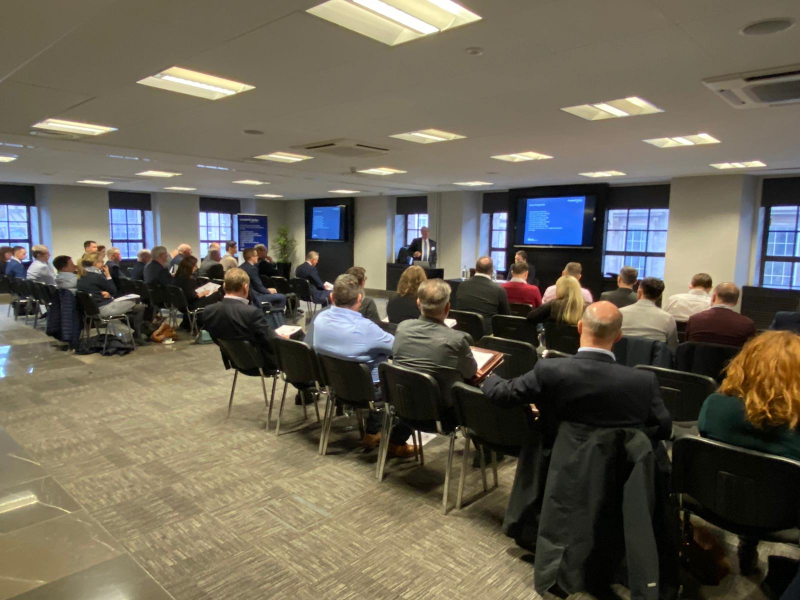‘The world wants to do business with Scotland’, Campbell Dallas international trade event told
International business opportunities have never been more exciting or potentially more rewarding for Scottish businesses and the business community should explore the huge potential on offer, delegates to a Campbell Dallas international business event were told yesterday.

Hosted by Campbell Dallas in partnership with experts from affiliate firms based in the USA, China, India and Ireland, the international business event explored how Scottish businesses could begin trading with the four countries.
Expert speakers outlined the different economic and political profiles of each country, how their international business and tax systems are structured, and highlighted some of the key challenges and risks to consider.
Fraser Campbell, head of family business and international advisory partner at Campbell Dallas and who chaired the event, said: “Three consistent themes emerged during the presentations. Firstly, it was clear that many countries are open for business and would like to do business with Scottish companies. This is particularly important given that we are now heading towards some form of conclusion to Brexit.
“Secondly, whilst their tax and trade rules are different, there is a consistent desire to see international business dealings taking the form of inward investment, preferably involving a physical presence. Attractive incentives are increasingly being offered to encourage, retain and reward sustainable inward investment.
“Thirdly and most importantly, whilst the rewards of international business can be significant, the cost of getting it wrong can be punitive. All the speakers said it was critical to obtain advice, even just a phone call or email, before committing to any form of business structure or enterprise.”
Cormac Doyle, head of tax with EisnerAmper in Dublin, added that Ireland is proving a popular inward investment location as UK companies seek a more direct springboard into the EU market.
He said: “Clearly many companies want to ensure they can continue to access both the Irish market and the much larger EU market as seamlessly as possible. There are attractive incentives to invest in intellectual property and knowhow and the Corporation Tax rate is also very competitive. An Irish business presence could offer Scottish businesses a key competitive advantage.”
Gerard O’Beirne, a tax partner with EisnerAmper in New York also pointed to a range of incentives designed to encourage businesses to invest in the USA.
He explained: “The government wants international businesses to be part of the economy from within, not just trade with the USA. To facilitate this shift, the Trump administration introduced the FDII legislation – foreign-derived intangible income. FDII is designed to encourage investment in IP and the knowledge economy, with qualifying international ventures eligible for corporate tax rates as low as 13.25%.”
Amit Maheshwari, a tax partner with Ashok Maheshwari & Associates in New Delhi pointed out that the Indian government had made investment in manufacturing a major strategic target.
Maheshwari said: “India has attractive incentives for businesses wanting to establish and grow a manufacturing presence in India. The incentives have been made more attractive and include lower corporation tax rates and a benign approach to the extraction of profits and dividends. The most popular business structure we now create for clients is the LLP (limited liability partnership) as it is frequently the most suitable model for the international trade tax regime.”
Alex Xie, a tax director with SBA Stone Forrester in Hong Kong said that China is also reaching out to attract inward investment with its own range of attractive tax and regulatory incentives.
He added: “China wants to undertake more international trade but realises that it has to help overseas businesses commit to engaging with the world’s largest economy. Key to encouraging international trade is a wider range of tax and trade incentives, plus corporation tax as low as 15% as long as it is a qualifying business activity within the high technology sector.”
Summing up, Fraser Campbell said: “The last few years have been challenging for all of us in business but today was a welcome reminder that there is a world of business available to ambitious Scottish companies, and we should do our utmost to help them capitalise on the opportunities.
“The timing is good given that many tax systems have become more flexible and accommodating, with governments having a better understanding of how businesses operate. As such, the current range of incentives for international business are as good as any for a long time. However, it is always crucial to remember to seek advice before embarking on any significant investment. It is easier to prevent problems than it is to fix them.”










